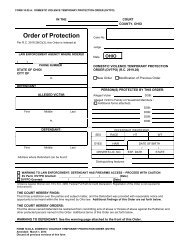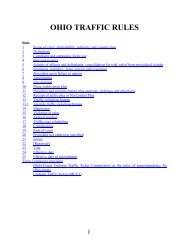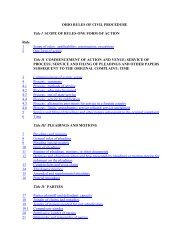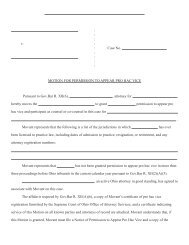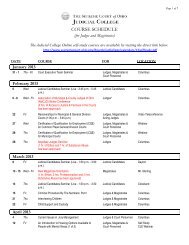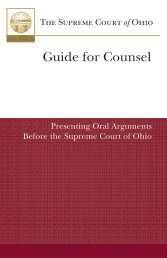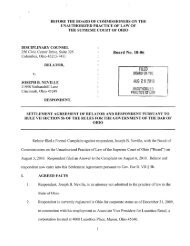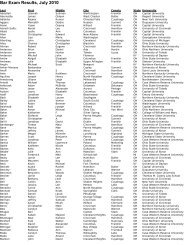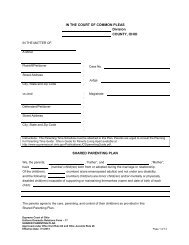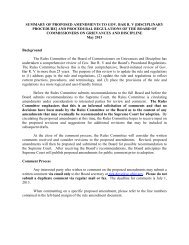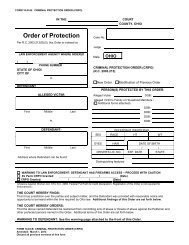disciplinary handbook: volume v - Supreme Court - State of Ohio
disciplinary handbook: volume v - Supreme Court - State of Ohio
disciplinary handbook: volume v - Supreme Court - State of Ohio
You also want an ePaper? Increase the reach of your titles
YUMPU automatically turns print PDFs into web optimized ePapers that Google loves.
Heiland, Disciplinary Counsel v.116 <strong>Ohio</strong> St.3d 521, 2008-<strong>Ohio</strong>-91. Decided 1/17/2008.Case Summaries- 117As to Count I, respondent filed a complaint in common pleas court on behalf <strong>of</strong> his wife, her sister, andtheir parents to enjoin a health care company (Royal Manor) from discharging the mother from a nursinghome (Palm Crest) for nonpayment <strong>of</strong> fees. The complaint asserted the mother was incompetent and anattached affidavit <strong>of</strong> respondent‘s wife stated the mother had a condition <strong>of</strong> suspected Alzheimer‘sdisease so advanced she does not understand who or where she is. On January 31, 1998, a day afterfiling the complaint, respondent witnessed a document signed by the mother purporting to grantrespondent‘s wife power <strong>of</strong> attorney to act on her behalf. Panel and board found violation a <strong>of</strong> DR1-102(A)(6). As to Count II, on February 4, 1998, the father granted power <strong>of</strong> attorney to respondent‘swife. Between 1998 and 2001, respondent, with his wife‘s assistance, deposited the mother‘s pensionchecks and the father‘s pension and Social Security checks into his client trust account. He also depositedsome <strong>of</strong> his wife‘s earnings from a church into his client trust account. During this time, he deposited$68,917.79 into his trust account, $40,000 <strong>of</strong> which came from the in-laws and his wife. He wrote 292checks for a total <strong>of</strong> $60,195, from his trust account, 262 <strong>of</strong> the checks were payable as cash.Respondent has no records accounting for the money. He testified he gave the money to his wife asattorney-in-fact for her parents. From February 1995 to February 1999, the father resided at retirementvillage (Anchor Lodge). Respondent‘s wife wrote four checks totaling $9,162 that were returned forinsufficient funds. Anchor Lodge made repeated attempts to collect the debt and then caused criminalcharges to be filed against respondent‘s wife for passing bad checks. The charges were dismissed afterrespondent paid Anchor Lodge $4,141.86 by a check drawn on his trust account. From February 5, 1999to January 6, 2000, the father resided at another facility (Parkvue), during which time respondent wrote92 checks on the IOLTA account with 87 checks payable to cash and totaling $28,530.86. Respondentcould not account for the money received when he negotiated the checks other than to say he gave themoney to his wife for the father‘s care. None <strong>of</strong> the withdrawals was used to pay Parkvue. WhenParkvue discharged the father on January 6, over $53,000 was owed to Parkvue. On May 5, 2000, thefather was admitted to another facility (Avon Oaks). Respondent wrote 86 checks on the trust accountpayable to cash for a total <strong>of</strong> $20,306.62. Respondent could not account for the money other than to sayhe gave the money to his wife to use for the father‘s care. None <strong>of</strong> the money was used to pay AvonOaks. By November 2000, over $29,000 was owed to Avon Oaks. Respondent was indicted by a grandjury on June 5,2002 on three counts felony theft for his participation in the scheme to defraud his in-lawsand various nursing homes from January 31, 1998 to April 30, 2001. He entered an Alford guilty plea onApril 30, 2001 to three misdemeanor counts <strong>of</strong> defrauding creditors. Board concluded he used his clienttrust account to launder money from the couple‘s retirement funds. By depositing the money into histrust account and doling it out in cash to his wife, he and his wife were able to keep it from the nursinghomes and Medicaid. Respondent overdrew his bank account on four separate occasions in August1998. Board found violations <strong>of</strong> DR 1-102(A)(3), 1-102(A)(4), 1-102(A)(5), 1-102(A)(6), and 9-102(B)(3). As to Count III, respondent‘s client trust account was entitled ―Legal Aid TrustAccount/<strong>State</strong> <strong>of</strong> <strong>Ohio</strong>/Eric K. Heiland. Board found a violation <strong>of</strong> DR 1-102(A)(4) becauserespondent had no affiliation with Legal Aid or any other government-subsidized legal-servicesorganization. As to Count IV, respondent agreed at his deposition to provide federal income tax return for1999, 2000, and 2001, but failed to do so. Twice the panel chair ordered him to produce the tax return,but he has not and at hearing refused to answer question regarding their production. Board found aviolation <strong>of</strong> Gov.Bar R. V(4)(G). In aggravation, he acted with dishonest or selfish motive, showed apattern <strong>of</strong> misconduct involving multiple <strong>of</strong>fenses, failed to cooperate fully and submitted false evidence,made false statements, engaged in other deceptive practices, refused to acknowledge wrongful nature <strong>of</strong>his misconduct and that the victims suffered harm. BCGD Proc.Reg. 10(B)(1)(b), (c), (d), (e), (f), (g),(h). In mitigation, he had no prior discipline and has been sentenced for his misdemeanor. BCGDProc.Reg.10(B)(2)(a), (f). Board recommended an indefinite suspension. Among other objections,respondent maintained the board was precluded from finding a Gov.Bar R. V(4)(G) violation because heinvoked his Fifth Amendment right against self-incrimination. The court found his reliance on Spevack



